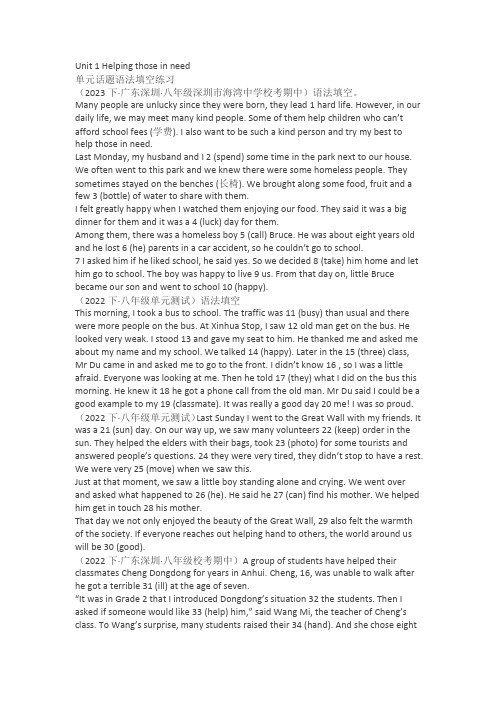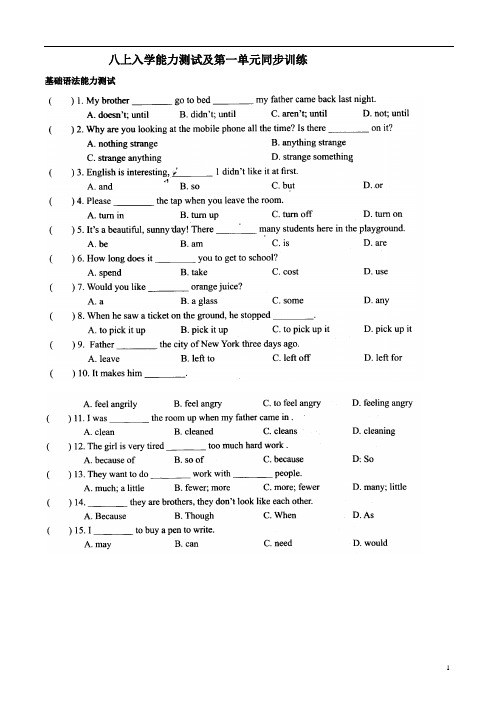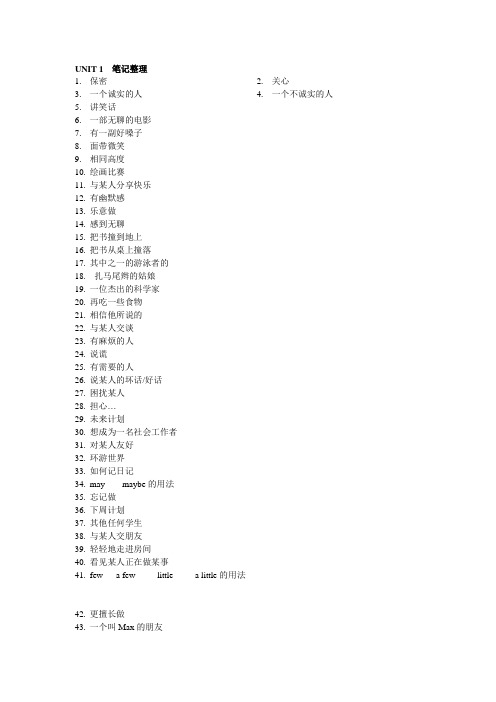新版牛津八年级第一单元词组及配套练习
八年级英语下册(牛津深圳版)Unit1 单元话题语法填空练习(含解析)

Unit 1 Helping those in need单元话题语法填空练习(2023下·广东深圳·八年级深圳市海湾中学校考期中)语法填空。
Many people are unlucky since they were born, they lead 1 hard life. However, in our daily life, we may meet many kind people. Some of them help children who can’t afford school fees (学费). I also want to be such a kind person and try my best to help those in need.Last Monday, my husband and I 2 (spend) some time in the park next to our house. We often went to this park and we knew there were some homeless people. They sometimes stayed on the benches (长椅). We brought along some food, fruit and a few 3 (bottle) of water to share with them.I felt greatly happy when I watched them enjoying our food. They said it was a big dinner for them and it was a 4 (luck) day for them.Among them, there was a homeless boy 5 (call) Bruce. He was about eight years old and he lost 6 (he) parents in a car accident, so he couldn’t go to school.7 I asked him if he liked school, he said yes. So we decided 8 (take) him home and let him go to school. The boy was happy to live 9 us. From that day on, little Bruce became our son and went to school 10 (happy).(2022下·八年级单元测试)语法填空This morning, I took a bus to school. The traffic was 11 (busy) than usual and there were more people on the bus. At Xinhua Stop, I saw 12 old man get on the bus. He looked very weak. I stood 13 and gave my seat to him. He thanked me and asked me about my name and my school. We talked 14 (happy). Later in the 15 (three) class, Mr Du came in and asked me to go to the front. I didn’t k now 16 , so I was a little afraid. Everyone was looking at me. Then he told 17 (they) what I did on the bus this morning. He knew it 18 he got a phone call from the old man. Mr Du said I could be a good example to my 19 (classmate). It was really a good day 20 me! I was so proud. (2022下·八年级单元测试)Last Sunday I went to the Great Wall with my friends. It was a 21 (sun) day. On our way up, we saw many volunteers 22 (keep) order in the sun. They helped the elders with their bags, took 23 (photo) for some tourists and answered people’s questions. 24 they were very tired, they didn’t stop to have a rest. We were very 25 (move) when we saw this.Just at that moment, we saw a little boy standing alone and crying. We went over and asked what happened to 26 (he). He said he 27 (can) find his mother. We helped him get in touch 28 his mother.That day we not only enjoyed the beauty of the Great Wall, 29 also felt the warmth of the society. If everyone reaches out helping hand to others, the world around us will be 30 (good).(2022下·广东深圳·八年级校考期中)A group of students have helped their classmates Cheng Dongdong for years in Anhui. Cheng, 16, was unable to walk after he got a terrible 31 (ill) at the age of seven.“It was in Grade 2 that I introduced Dongdong’s situation 32 the students. Then I asked if someone would like 33 (help) him,” said Wang Mi, the teacher of Cheng’s class. To Wang’s surprise, many students raised their 34 (hand). And she chose eightboys to form 35 special group to help Cheng. The group would take him to school 36 bring him back every day, help him at lunch and play with him during the breaks. After several years, Xie is responsible for 37 (carry) Cheng in and out of the wheelchair as he is 38 (strong) than others. 39 (luck), Cheng’s situation is 40 (get) better with the help of great doctors.(2022上·广东深圳·八年级校考期中)阅读下面短文,在空格处填入一个适当的词或使用括号中词语的正确形式填空。
Unit1重点词组牛津译林版英语八年级下册

牛津译林版2022-2023常州市8B U1 重点词组1.和我分享食物share food with me 固定搭配share sth with sb2.过去总是对我很友好used to be kind to meused to do sth 过去常常做某事对某人友好be kind to sb3.公交车上太多的人too many people on the busToo many +可数名词复数too much+不可数名词4.等候下一趟地铁wait for the next underground for 不要漏掉5.对这个小镇很了解know the town very well词组对…很了解know sth well6. 搬家move house 注意house直接用7.住在小镇北部live in the northern part of town 另外一种表达live in the north of town Northern 形容词+名词part north名词8. 结婚get married 注意marry动词married形容词与某人结婚marry sb/get married to sb9.从那时起since then then在那时两次词组要注意区别10.把小镇中心的部分地区变成新公园turn part of the town centre into a new park11.改变了许多change a lot 注意这边change 是动词12.两家钢铁厂two steel factories factory变成复数13.把废弃物丢进河里put the waste into the river 把..放在..里面put..into..废弃物waste不可数名词14.意识到这个问题realize the problem15.采取行动来改善形势take action to improve the situation16在某些方面in some ways 固定搭配17.拥有一个美丽而现代的小镇have a beautiful modern town18.像以前一样经常互相见面see as often as before19.感到一丝孤独feel a bit lonely a bit+形容词Lonely 形容词孤独的偏僻的区别alone独自一人=by oneself=on one’s own20.偶尔,有时from time to time =sometimes21.告诉我关于你采访他的情况tell me about your interview with him注意interview这里是名词动词interview 词组采访某人interview sb/have an interview with sb22.关于过去一个世纪北京的变化about the changes in Beijing over the past century注意change这边是名词复数23.北京的过去与现在Beijing's past and present ‘s表示的不要忘记24. 自从周一起since Monday 25.干净而新鲜的空气clean and fresh air26.生活条件living conditions Condition条件是可数名词情形是不可数名词27.乘坐公交车进出小镇travel to and from the town by bus 词组很重要28.另一个巨大的变化another big change 29.从美国回来return from the USA30.和她父母一起去国外go abroad with her parents这里abroad是副词,前面不能用介词31.上小学be at primary school 介词是at32.互相保持联系keep in touch with each other 固定搭配33.主要通过电子邮件交流mainly communicate by email34.使交流容易得多make communication much easier35.迅速习惯生活的变化get used to the change of life quickly习惯于be/get used to sth/doing36.独自乘公交车上学go to school by bus on one's own37.在大片的空地上in large open spaces在介词用in,space这里是空地可数名词,空间不可数38.在某人的闲暇时间in one's free time39.拥有自己的小汽车have one's own car(s) 这里own自己的是形容词40. 享受舒适的生活enjoy a comfortable life 过上…的生活live/enjoy a ….life。
牛津译林版八年级下Unit 1 Past and Present Reading同步练习(含答案)

8B Unit l Past and PresentReading一.将下列短语译成英语1.有时感到有点孤单2.非常了解...3.在镇的北部4.在这些年期间5.在某种程度上6.改成一个新的公园7.我的大多数老朋友8.和过去一样频繁地见到彼此9.打牌,下中国象棋10.采访某人二.根据句意,从方框中选用合适的词或短语,并用其正确形式完成下列句子。
2.--What do you often do when you have time at home?--I often with my friends.3.Though he sat in the classroom, he didn’t listen to the teacher carefully. He looked out of the window and wanted to play football on the playground.4.In his dream, he a bird and flew in the sky.5.We must to stop pollution.6.I found a job in town, so I there.7.I practice playing the piano I can in my free time.8., my classmates are my teachers, because I have learned a lot from them.9.He is my best friend .10.The story in 1987.三.用所给单词的适当形式填空1.They live in the same housing estate, but in different (black).2.Nothing can prevent us from (realize) our dreams.3.Is it necessary (do) it like this, Mary?4.There is a big zoo in the (south) part of the city.5.The shirt is beautiful. I like (it) colour.6.It is three years since he (begin) learning English.7.Kate feels much (good) today.8.Mr. Wang is the (one) to come to his office and the last to leave.9.Do you have a large (shop) mall near your flat?10.Great (change) have taken place in our hometown.四.将下列句子译成英语1.过去在阳光河附近有一个钢铁厂。
牛津版英语八年级上册Unit1 Encyclopaedias同步练习

八上入学能力测试及第一单元同步训练
4、You can try borrowing some money from this rich woman,but I am afraid she won’t lend even one dollar to you.
5、To our surprise,though the result of the exam is surprising,the teacher was not surprised at it.
3、Sometimes,the tired scientist wants to give up the plan for he has failed in the experiment some times,but he still spends some time on it every day because he believes he will be successful sometime.
基础语法能力测试
完型填空
阅读理解
句型理解(翻译下列句子)
1、It is reported that last Tuesday,a young traffic policeman was knocked down by accident and sent to the nearby,we agree that we should take full advantage of time to practicse ourselves and receive more education so that we will have a bright future.
最新版2019-2020年牛津深圳版八年级英语上册Unit1复合不定代词专题练习及答案-精编试题

牛津深圳版八上Unit1 EncyclopaediasGrammar复合不定代词同步练习一、用不定代词及不定副词填空。
1.Do you have __________ questions?2.He is taller than __________ other boy in his class.3.Please help yourself to _________ soup.4.I don't think ________ knows her new address.5.There's ________in the new cupboard. It's empty now.6._________is too difficult if you put your heart into it.7.Would you like __________ milk to drink?8.________can run fast than he. He 's the winner.9.Could you tell ________ different between the two pictures?10.I'm so thirsty. Shall we get __________to drink?二、单选。
( )1.She doesn’t have ____ cakes. She has some fish. A.some B.much C.any D.little( )2.--Are there ____ computers in your classroom?--- No. There aren’t ___ computers in our classroom. A.some; some B.any; anyC.some; any D.any; some( )3.There is_______ food here. We must go and buy some.A.some B.any C.no D.a little( )4.There isn’t ________ in the classroom.A. everybodyB. somebodyC. anybodyD. nobody( )5. I can’t find_________ in the cardboard box. It’s empty.A. somethingB. anythingC. nothingD. some things( )6.---Did you see ______ in the classroom?---No, I saw ______ in the classroom.A. someone;anybodyB. anyone;nobodyC. someone;somebodyD. anyone;anybody( )7.I agree with most of what you said, but I don’t agree with ________.A. everythingB. anythingC. somethingD. nothing( )8.Be quiet! I have ____ to tell you.A.important anything B.anything importantC.important something D.something important( )9.–Have you got ______ready for the sports meeting?-Not. Yet. We still have ______ to do.A. anything; nothingB. something; everythingC. everybody; somethingD. something; nothing( )10. ______ is impossible if you put your heart into it.A. EverythingB. AnythingC. SomethingD. Nothing三、选词填空。
新牛津八年级上 期中复习 unit1-2词组默写

1.保密2.关心3.一个诚实的人4.一个不诚实的人5.讲笑话6.一部无聊的电影7.有一副好嗓子8.面带微笑9.相同高度10.绘画比赛11.与某人分享快乐12.有幽默感13.乐意做14.感到无聊15.把书撞到地上16.把书从桌上撞落17.其中之一的游泳者的18.扎马尾辫的姑娘19.一位杰出的科学家20.再吃一些食物21.相信他所说的22.与某人交谈23.有麻烦的人24.说谎25.有需要的人26.说某人的坏话/好话27.困扰某人28.担心…29.未来计划30.想成为一名社会工作者31.对某人友好32.环游世界33.如何记日记34.may maybe的用法35.忘记做36.下周计划37.其他任何学生38.与某人交朋友39.轻轻地走进房间40.看见某人正在做某事41.few a few little a little的用法42.更擅长做43.一个叫Max的朋友1.提问外貌:提问性格:2.讲英语3.用英语说…4.为什么不做…5.Hope的用法6.尝试做…7.尽某人最大努力做….8.OtherAnotherOne…the other…Others9. 期盼做…10. 需要做…11.不需要做…(2种)12. 做…很愉快(2种)what a great time you have__________(do). What fun you have __________(do) 13.花时间做,,,14.练习做…15.算出这个数学题16.容易得多17.一个半小时(2种)18. 带有图片的书19. 和某人讨论…20.在马路的2边21.在马路的每一边22.在上学期期末23.休息更多的天数24.和…不同25.与…相似26.和…一样27.any, any other的用法28.有20分钟用来下棋29. 说得更慢些30.…的高度/重量/长度31. 与….颜色一样32.害怕做…33.不得不做…34.像看电视35.你想知道我的学校生活是怎样的吗?36.为某人买…37.在周末38.一场重要的比赛39一起上课40.向某人借….41.把….借给某人42. 对…了解更多43. 给我帮助44.在周五下午45.既…又…46.一篇由一个美国男孩写的文章47.对John你还知道些什么??48. 在赛跑中得了第一名49.我们班其他的学生(2种)50.学生的数量_ __ 表示_ __51. 早锻炼52. 穿校服53. 最多/至少54. 去游泳大约半小时55. 快速浏览问题56. 学习外语是…57. 我的日常生活58. 看英语视频59. 选择…去做…60.进行学校旅行61. 把大部分时间花在业余爱好上。
牛津译林版八年级英语下册Unit1基础练习(可编辑修改word版)
一,翻译下列词组8B Unit1 Past and present1.写一写阳光镇的变化2.很了解阳光镇3.和我的家人搬家到这里4.在这个城镇的南部5.一起居住直到1965 年6.搬到另一座公寓7.在城镇的中心8.给我们买一个新的公寓9.改变许多10.在过去11.一个老电影院12.把这个地方变成一所公园13.与你的老朋友见面14.在周末见面15.打牌和下象棋16.水污染17.过去常常做某事18.把废料倾倒到河里20.采取措施降低污染21.干净的多22.在某些方面23.开阔地和漂亮的公园24.搬到北京的其他地区25.感觉有点孤单26.偶尔27.回来看我28.使我开心29.从美国回来30.出国31.在小学32.与,,,保持联系33.使交流更容易34.流过城镇中心35.习惯生活的变化36.享受舒适的生活37.在两边19.污染河水二、根据课文Reading 及首字母填空Mr. Chen k Sunshine Town well. He first lived in the s part of the town in the city with his parents. When he got m in 1965, he and his w moved to another flat in the centre of the town. They moved again last year.Sunshine Town has changed a lot. In the past, 30000 people lived in the town. They had their own small restaurants, s and market s . They also had a small post o and an old c . Now, the place has t into a park.In some w , life is better now. Mr. Chen thinks it’s nice to have o space and pretty gardens. H , it has become more difficult to see his old friends. Many of them have moved to other areas and Mr. Chen feels a bit l from time to time.Grammar(1)一、写出下列动词的过去式和过去分词1. come2. see3.give4.write5.make6.put7.go8.see9.forget二、现在完成时10.learn11.decide12.repair13.finish14.14.play15.be1.定义:发生在过去的事情或动作,一直持续到现在并有可能继续持续下去。
2019-2020学年牛津版八年级英语Unit 1 单元同步练习.doc
2019-2020学年牛津版八年级英语Unit 1 单元同步练习Ⅰ. 词汇(20分)A) 根据句意及首字母或汉语提示,完成下列单词。
(10分)1. Tom isn’t h______, we never believe what he says.2. Betty is always g________ to old people.3. My friend often shares his j_______ with me.4. Our teachers are always w_______ to help us with our study.5. We ought to be r______ to help old people in need any time.6. You can read many ______(杂志) in the reading room.7. When he stands in the front of the class, he feels very ______(紧张不安的).8. The woman with ______(齐肩的) hair is his mother.9. Living in this old, small flat must be very _____(不舒服的).10. There are many ______(广告) in today’s newspaper.B) 用括号中所给词的适当形式填空。
(5分)11.Learning English has a great number of (大量的) _______(read) in China.12. My friend Elva is crazy about music, she is very _______(music).13. Skiing is as _______(danger) as diving.14. Alan is very clever and can always answer questions ________(correct).15. The _______(high) of Millie is 135cm.C) 选用合适的词组的正确形式填空。
牛津版英语八年级下册Unit 1重点词组默写
8B Unit 1重点词组和句子(答案)班级:姓名:Comic strip & Welcome to the unit1.你见过我的食物吗?Have you seen my food?2.我刚刚把它吃了。
I’ve just eaten it.3.你变了。
You’ve changed.4.过去常常做某事used to do sth.5.过去对某人友好used to be kind to sb.6.你过去常常与我分享食物。
You used to share food with me.7.我过去常常骑自行车上学。
I used to go to school by bike.= I often went to school by bike in the past.8.太多人too many people 太多车辆too much traffic9.等下一班车要花很长时间。
It took a long time to wait for the next bus.10.你为什么不乘公共汽车?Why didn’t you take a bus?11.去其他城市go to other citiesReading12.对…非常了解know a lot about … = know … very well13.对阳光镇几乎不了解know little about Sunshine Town14.你非常了解阳光镇吗?Do you know Sunshine Town very well?15.搬家move house16.在小镇北部in the northern part of town17.结婚get/be married18.阳光镇这些年来变化很大。
Sunshine Town has changed a lot over the years.19.把部分镇中心变成一个新公园turn part of the town into a new park20.往河里排放废物put the waste into the river21.钢厂曾经把废料倒入河里。
译林牛津八年级下Unit 1 Past and prent重点语法和句型及练习(含答案)
译林牛津八年级下Unit 1 Past and prent重点语法和句型及练习(含答案)Unit 1 Past and prent一. 教学内容:Unit 1 Past and prentwords, phras and ntences二. 教学目标:掌握Unit 1的词汇及词性变化和课文中的重点词组、句型的结构和用法Unit 1 Past and prent(一)基础词汇1.过去,往事past目前,现在prentn. 现在,通常与过去、将来相对应。
The past, the prent and the future . 过去、现在和将来。
at prent. 此刻、现在I’m afraid I can’t help you just at prent. ----- I’m too busy.很抱歉,我现在帮不了你,-----实在太忙了。
adj. 现在的。
the prent day当今、现今。
Most young people enjoy listening to popular music the prent day. )2.刚刚just(just, adv. 刚才。
常用于完成时态,在美式英语中用于一般过去时。
)I have just en John. 我刚才见到约翰了。
I just saw him. (a moment ago). ( U. S)我(几分钟前)看到他的。
( U. S)3.自……以来since(since. 后面通常接点时间来表示一段时间。
例如:since 1984 自从1984年一直到现在。
since 3 days ago. 自从三天前一直到现在,也可以说成for 3 days 通常用how long提问。
How long has your uncle lived here? Since 1980. )4.已婚的married(marry. vt. vi marry sb. 与某人结婚;嫁或娶某人。
- 1、下载文档前请自行甄别文档内容的完整性,平台不提供额外的编辑、内容补充、找答案等附加服务。
- 2、"仅部分预览"的文档,不可在线预览部分如存在完整性等问题,可反馈申请退款(可完整预览的文档不适用该条件!)。
- 3、如文档侵犯您的权益,请联系客服反馈,我们会尽快为您处理(人工客服工作时间:9:00-18:30)。
8A unit1 短语 1.used to do 过去常常 2.be kind to sb. 对某人友好 3.over the years 近些年 4.in the northern part of 在···的北部 5.get married 结婚 6.turn into 把···变成··· 7.put the waste into···把废弃物倒进··· 8.Take action to ... 采取措施做··· 9.in some ways 在某些方面;在某种程度上 10.much cleaner 干净的多 11.most of 大多数的 12.move away 搬走 13.a bit lonely 有点孤单 14 from time to time时常 15.all one’s life 某人一生中 16.in the past 在过去 17.return from the USA从美国回来 18.go abroad 出国 19.keep in touch with 保持联系 20 be/get used to sth./doing sth.习惯于··· 21.on one’s own 独自 22.spend st. doing/on sth.花费时间做某事 23.take place 发生 24.open space 开阔的空地 25.in one’s free time在某人的空闲时间 26. enjoy a comfortable life 享受着舒适的生活 27.make communication 交流 28.the history of China 中国的历史 29 past and present 过去和现在 30.realize the problem 意识到这个问题 31. play cards 打牌 32.share food with me 和我分享食物 33. On both sides 在两边 34. have their own cars 有他们自己的车
Grammar 现在完成时 现在完成时用来表示之前已发生或完成的动作或状态,但它的影响现在还存在;也可表示持续到现在的动作或状态。其构成: have (has) +过去分词。规则变化的过去分词与过去式的变化一样,在动词词尾加ed; 不规则变化的过去分词见不规则动词表,需要同学记忆。 现以see the film为例将现在完成时的肯定句, 否定句和疑问句列表如下: 肯定句:I/You/We/They have seen the film. He/She /It has seen the film. 否定句:I/You/We/They have not/ haven’t seen the film. He/ She/It has not/hasn’t seen the film. 疑问句:Have I/you/they seen the film? Yes, you/ we/I/they have. No, you/ we/I/they haven’t. Has he/she/it seen the film? Yes, he/ she/ it has. No, he/ she/ it hasn’t. 二、用法:现在完成时既涉及过去,又联系现在。用法一:表示过去发生或已经完成的某一动作对现在造成的影响或结果。常与just(刚刚),already(已经),never(从来没有),ever(曾经),before(以前),yet(仍然),once(一次),twice(两次),many times(很多次),how many times(多少次),so far(迄今为止),during the past(last)three years(最近三年来)等连用。 ※ 副词的位置:①just常用于肯定句中,放在have / has后,He has just come . ②never表示否定, 放在have / has后, He has never visited the Great Wall. ③ever用于疑问句中,句型为: Have / Has+主语+ever +过去分词?―…曾经……过吗?‖用于询问某人过去的经历。Have you ever been to the farm? ④before用于句末,The woman has never heard of that before. ⑤yet 用于句末或not 之后.Has the train arrived yet? No, not yet. ⑥already用于肯定句, have / has 之后或句末.We have already finished it. ⑦so far用于句首或句末. So far, we have visited the moon. 用法二:表示过去已经开始,一直延续到现在的动作或状态。时间状语有: ① for+表示一段时间的词语I have taught English for 19 years。 ② since+表示过去时间点的词语He has been at this school since 1986. ③ since+表示过去的时间状语从句I have lived here since I was born. ④ since+一段时间+ago. I have known him since 20 years ago. 三、现在完成时态中可以和表示一段时间状语(for,since,how long, all one’s life)连用的动词必须是表示延续的情况或动作的动词,即延续性动词。如:be,have,know,live,work,study,learn,teach,keep,speak,talk,draw,wait,wear,walk,sleep,drive,write,do,clean等。 I have been a teacher for nearly 20 years. How long has he lived here? 四、延续性动词的现在完成时可和包括―现在‖在内的(到说话时仍未结束)表示一段时间的状语连用。如this morning,today,this week,these days He has been to Beijing three times this year. He has written two letters this morning.(说话时间在上午)He wrote two letters this morning.(说话时间在下午或晚上) 五、英语中还有一些动词的意义决定它们所表示的动作不能延续,只是一瞬间 就结束的动作,这类动词叫做―非延续性动词‖,常见的有:come,go,arrive,reach,see,hear,close,open,leave,begin,start,lose,buy,fall,join,die,get up,become,borrow,lend,find,finish,receive等。这些动词可用于现在完成时,说明某个动作的结果还存在,但不能和表示一段时间的状语(how long,for,since)连用。He has come back.(√)He has come back for two hours.(×) ※ 但在否定句中,非延续性动词也可用表示一段时间的状语来修饰,如 I haven’t heard from my father for a long time. We haven’t seen him since 1999. 六、当终止性动词(非延续性动词)与表示一段时间的状语(how long,since,for, all one’s life)相矛盾时,改正错句的方法有如下几种: (1)用副词ago把现在完成时的句子改为一般过去时. He has come back for two weeks.(错)改为:He came back two weeks ago.(正) I have lost my bike for ten days. (错)改为:I lost my bike ten days ago. (正) (2)用“It is / has been+时间+since+一般过去时态”句型来改写。 He has joined the League for 3 years. (错)It is 3 years since he joined the League. I have bought the book for 5 days. (错)It is 5 days since I bought the book. (正) He has died for 20 years. (错)It is 20 years since he died. (正) (3)用“时间+has passed+since+一般过去时态”句型来改写。 He has left home for 20 years. 改为:Twenty years has passed since he left home. He has lost his pen for 2 days. 改为:Two days has passed since he lost his pen. (4)用系表结构来改写. He has died for 20 years. 改为: He has been dead for 20 years. The factory has opened since 1999. 改为:The factory has been open since 1999. How long has he left? 改为:How long has he been away? (5)用相应的延续性动词替代非延续性动词。 He has bought the book for two weeks. 改为:He has had the book for two weeks. 常见的相应转换形式如下: borrow / lend→keep, buy→have, finish / end→be over, arrive /come / go / move / reach /get to→be in /at / be here /be there, begin / start→be on , open→be open , close→be closed, die→be dead , leave→be away(from),go to school→be in school / be a student, get up→be up, fall asleep→be asleep , fall ill→be ill, get to know→know, lose→be lost, become→be, return / come back / get back→be back, join→be in / be a…member, join the army→be in the army /be a soldier, receive / get a letter→have a letter , catch / get a cold→have a cold, begin to study→study, 他参军已有三年.He has joined the army for three years.(错)改为: He has been in the army for three years / since three years ago. He has been a soldier for three years / since three years ago. He joined the army three years ago. It is three years since he joined the army. Three years has passed since he joined the army. (1)He came to our village two years ago.=He our village since two years ago. (2)He left home three days ago=He home for 3 days. (3)I bought the watch 2 weeks ago=I the watch since 2 weeks ago. (4)It is 5 days since I borrowed the book=I the book for 5 days. (5)The film has begun= The film for half an hour. (6)I got to know him 10 years ago=I him for 10 years. (7)There is a factory=There a factory for 20 years. (8)Our school opened in 1960=Our school since 1960. 七、现在完成时中应注意的几个问题 1. have been to 和have gone to的区别 have been to 强调―去过‖,现已不在那里,如: He has been to the USA three times. 他到美国去过三次。(过去―到美国‖,现在已―不在美国‖) have gone to主要强调的是―去了‖,现在人不在说话的现场,如: --Where's your mother? --你妈妈在哪?
